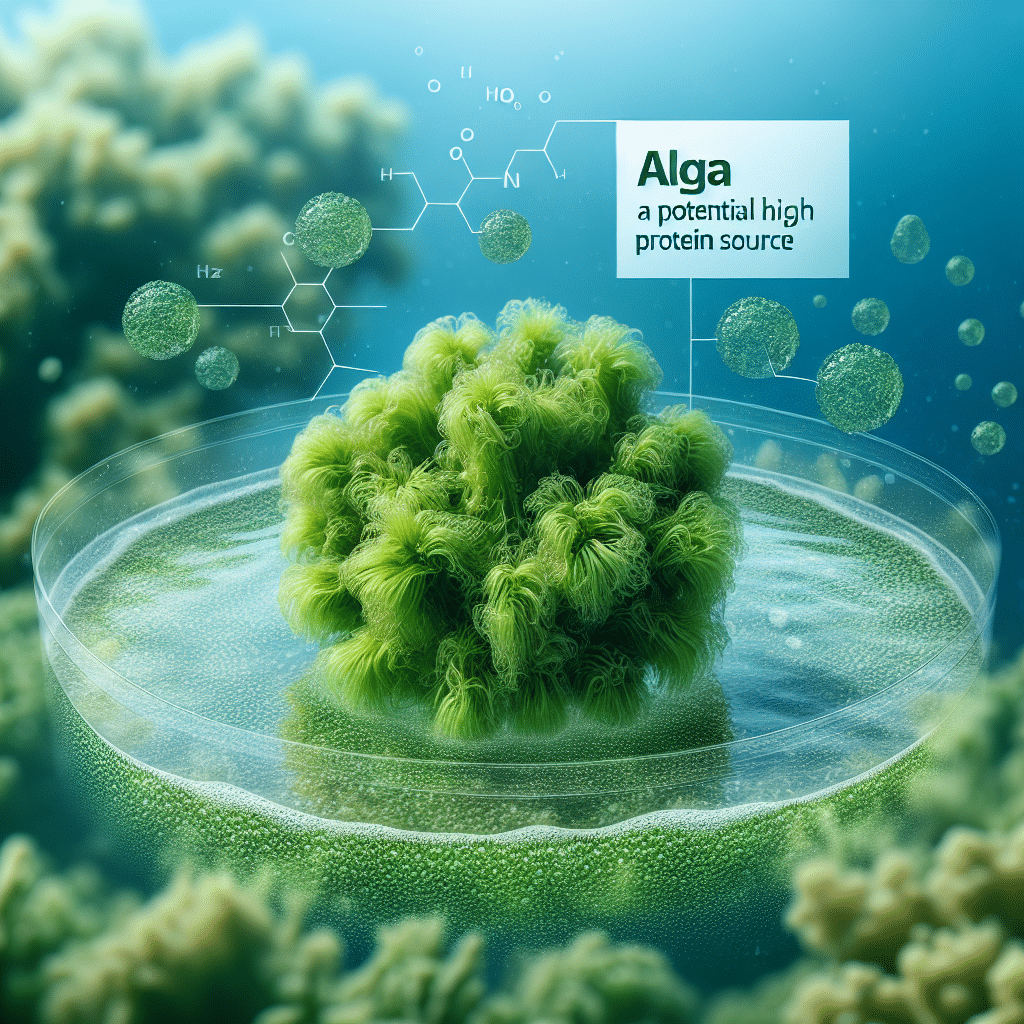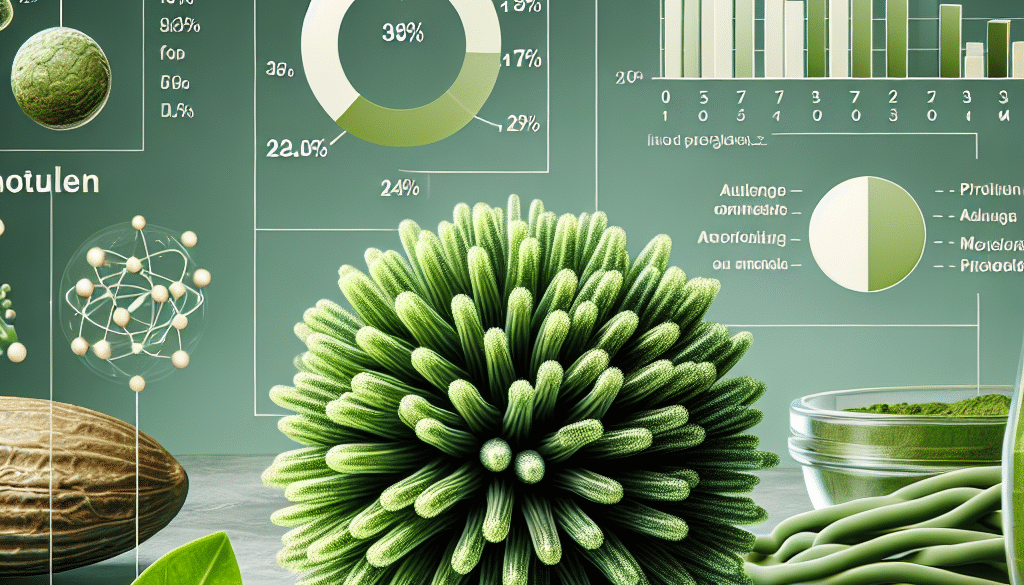Does Algae Have A Lot Of Protein?
-
Table of Contents
- Algae Protein: A High-Quality Plant-Based Nutrient Powerhouse
- Understanding Algae and Its Nutritional Profile
- Protein Content in Algae: A Closer Look
- Quality of Algae Protein
- Health Benefits of Algae Protein
- Environmental Impact and Sustainability
- Commercial Production and Applications
- Case Studies and Examples
- Challenges and Considerations
- Conclusion: Algae Protein’s Promising Future
- Discover ETprotein’s High-Quality Algae Protein Products
Algae Protein: A High-Quality Plant-Based Nutrient Powerhouse

As the global population continues to grow and the demand for sustainable food sources increases, the search for alternative protein sources has become more critical than ever. One such source that has garnered significant attention is algae. Algae, often referred to as the green gold of the future, is not just a simple plant but a potential key player in the global protein supply chain. This article delves into the protein content of algae and its potential as a nutritional supplement and sustainable food source.
Understanding Algae and Its Nutritional Profile
Algae is a diverse group of photosynthetic organisms that range from unicellular microalgae, like chlorella and spirulina, to multicellular forms, such as seaweeds. Algae thrive in various environments, including freshwater, marine water, and even on land. The nutritional profile of algae is impressive, as it is rich in vitamins, minerals, antioxidants, and essential fatty acids. However, one of the most intriguing aspects of algae is its protein content.
Protein Content in Algae: A Closer Look
Algae is often touted for its high protein content, which can vary significantly depending on the species. Microalgae, such as spirulina and chlorella, are particularly renowned for their protein richness. Here’s a breakdown of the protein content in some common types of algae:
- Spirulina: This blue-green algae can contain protein levels as high as 60-70% of its dry weight.
- Chlorella: Another microalgae, chlorella, boasts protein content ranging from 50-60% of its dry weight.
- Seaweeds: While not as protein-dense as microalgae, seaweeds like kelp and nori still offer a respectable amount of protein, around 10-20% of their dry weight.
These figures are particularly compelling when compared to traditional plant-based protein sources such as soybeans, which contain about 40% protein by dry weight, or lentils with approximately 25%.
Quality of Algae Protein
It’s not just the quantity of protein in algae that’s noteworthy, but also its quality. Algae protein is considered a complete protein, meaning it contains all nine essential amino acids that the human body cannot synthesize on its own. This is a significant advantage over many plant-based proteins, which often lack one or more essential amino acids.
Health Benefits of Algae Protein
Consuming algae protein offers numerous health benefits, including:
- Improved muscle repair and growth due to its rich amino acid profile.
- Enhanced immune system function thanks to its antioxidant properties.
- Support for cardiovascular health through its omega-3 fatty acid content.
- Potential weight management aid, as protein can increase satiety and reduce appetite.
Environmental Impact and Sustainability
Algae cultivation has a relatively low environmental footprint, making it a sustainable protein source. Algae can grow in a variety of water sources, including brackish and wastewater, and does not require arable land. Additionally, algae cultivation can help sequester carbon dioxide, contributing to the reduction of greenhouse gas emissions.
Commercial Production and Applications
The commercial production of algae protein is on the rise, with applications spanning from dietary supplements to animal feed. Algae protein powders and supplements are becoming increasingly popular among health-conscious consumers, especially those following vegetarian or vegan diets.
Case Studies and Examples
Several companies and research institutions have successfully harnessed the power of algae protein. For instance, the development of algae-based protein bars and shakes has provided convenient and nutritious options for athletes and busy professionals alike. Additionally, the use of algae protein in animal feed has shown promise in reducing the reliance on traditional feedstocks like soy and fishmeal.
Challenges and Considerations
Despite its potential, there are challenges to the widespread adoption of algae as a protein source. These include the cost of production, taste preferences, and the need for further research to optimize cultivation and processing methods. However, as technology advances and demand for sustainable protein sources grows, these challenges are likely to be overcome.
Conclusion: Algae Protein’s Promising Future
Algae’s high protein content, coupled with its sustainability and health benefits, make it a compelling alternative to traditional protein sources. As the world continues to seek out environmentally friendly and nutritious food options, algae protein stands out as a promising solution. With ongoing research and development, algae could very well become a staple in our diets, contributing to a healthier planet and population.
Discover ETprotein’s High-Quality Algae Protein Products
If you’re interested in exploring the benefits of algae protein, ETprotein offers a range of high-quality protein products derived from this remarkable organism. Their offerings are characterized by a neutral taste, non-GMO, allergen-free attributes, and are suitable for a variety of industries, including nutraceuticals, pharmaceuticals, and food and beverage.
About ETprotein:
ETprotein, a reputable protein and L-(+)-Ergothioneine (EGT) Chinese factory manufacturer and supplier, is renowned for producing, stocking, exporting, and delivering the highest quality organic bulk vegan proteins and L-(+)-Ergothioneine. They include Organic rice protein, clear rice protein, pea protein, clear pea protein, watermelon seed protein, pumpkin seed protein, sunflower seed protein, mung bean protein, peanut protein, and L-(+)-Ergothioneine EGT Pharmaceutical grade, L-(+)-Ergothioneine EGT food grade, L-(+)-Ergothioneine EGT cosmetic grade, L-(+)-Ergothioneine EGT reference grade and L-(+)-Ergothioneine EGT standard. Their offerings, characterized by a neutral taste, non-GMO, allergen-free attributes, with L-(+)-Ergothioneine purity over 98%, 99%, cater to a diverse range of industries. They serve nutraceutical, pharmaceutical, cosmeceutical, veterinary, as well as food and beverage finished product distributors, traders, and manufacturers across Europe, USA, Canada, Australia, Thailand, Japan, Korea, Brazil, and Chile, among others.
ETprotein specialization includes exporting and delivering tailor-made protein powder and finished nutritional supplements. Their extensive product range covers sectors like Food and Beverage, Sports Nutrition, Weight Management, Dietary Supplements, Health and Wellness Products, and Infant Formula, ensuring comprehensive solutions to meet all your protein needs.
As a trusted company by leading global food and beverage brands and Fortune 500 companies, ETprotein reinforces China’s reputation in the global arena. For more information or to sample their products, please contact them and email sales(at)ETprotein.com today.














